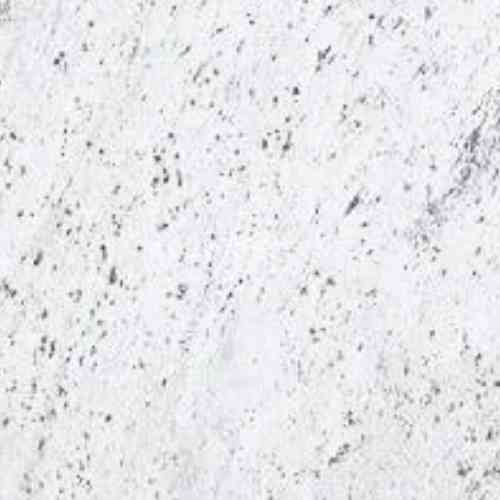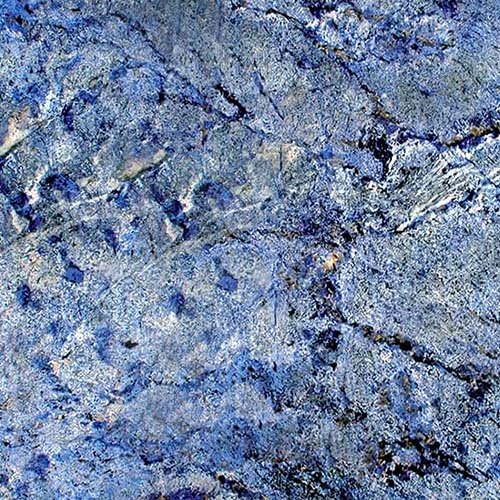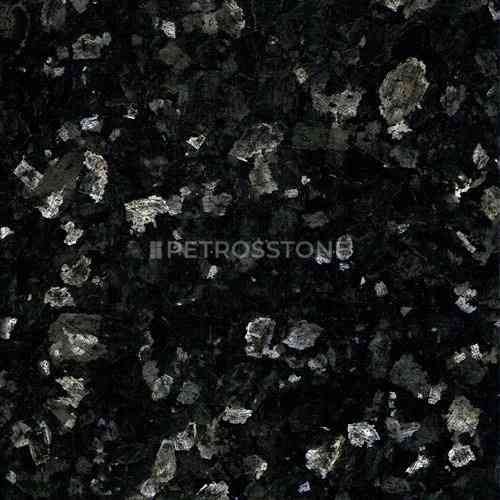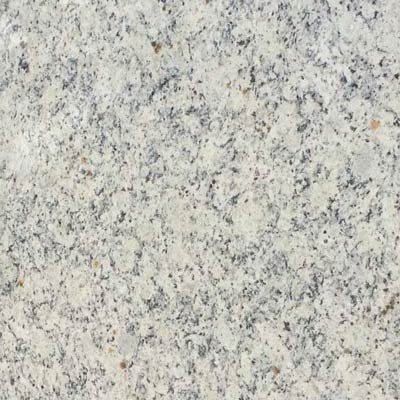The materials used for the kitchen countertop is very important since it must heat & stain resistant, at the same time be strong and beautiful.
Keeping this in mind, here is a list of the 10 Best Kitchen Countertop Materials in India:
- Granite Countertops
- Nano White Crystallized Solid Countertops
- Petrosstone Countertops
- High-Grade Quartz Stone Countertops
- Marble Countertops
- Metal Countertops
- Tile Countertops
- Glass Countertops
- Concrete Countertops
- Slate Countertops
- 1. Granite Countertops
- How to choose granite for Kitchen countertops?
- 2. Nano White Kitchen Countertop
- 3. Petros® Slab Countertops
- How to choose the Right Petros® Stone slab for your Kitchen Countertop?
- 4. Quartz Stone Slab Countertops
- 5. Marble Countertops
- 6. Metal Countertops
- 7. Tile Countertops
- 8. Glass Countertops
- Types of Glass for Kitchen Countertops
- 9. Concrete Countertops
- 10. Slate Countertops
1. Granite Countertops
Granite is the most popular kitchen countertop material in India. Because of its price, durability and availability, it has been the most prominent kitchen countertop material throughout the country.
Granite is natural metamorphic rock formed under extreme conditions of heat and pressure. As a result, it is highly resistant to temperature and chemical attacks. Granite is also one of the hardest countertop materials. On account of its superior properties, it is also one of the most durable kitchen materials.

How to choose granite for Kitchen countertops?
Now, let us discuss some important factors that you should keep in mind when choosing granite as a kitchen countertop material in India.
Thickness:
Obviously, the thickness of granite has an enormous impact on strength. The market standard thickness of granite is 17-18mm. Though this thickness is common, we always advise you to use at least 20mm thick granite slabs for kitchen Countertops. Not only are 20mm thick granite slabs stronger, but they also undergo stringent quality control procedures which improve the overall quality of granite you receive.
Size:
Granite is processed in two size standards:
- Cutter Size
- This size is about 8ft x 3ft. However, these standards vary. This size works the best for small kitchen countertops and other applications like door and window framing.
- Gang-Saw Size:
- This size is around 10ft by 6ft. It is usually only 20mm in thickness. Granite slabs of this size are exported. They are used for flooring and wall cladding.
Colour and Origin:
The colour and origin of the granite has the most noticeable impact on its properties. As a rule of thumb, light coloured granite is softer than dark-coloured granite. For the kitchen countertop: dark-coloured granite is preferable owing to its superior chemical and stain resistance.
Presence of Defects and Natural Variations
Presence of defects like cracks and lines can be detrimental for the strength of the granite. Hence, make sure you scrutinise all the granite slabs before fitting.
To learn more about granite countertops, refer to the following articles:
- What is the standard size and thickness of granite?
- Can we use granite for flooring? Pros and Cons
- Granite prices in India
- Best Granite for Kitchen Countertops
Price of granite slabs: ₹55 per square foot to ₹825 per square foot
Thickness of granite slabs: 18 mm / 20 mm / 30 mm
Size of granite slabs: 8 feet x 3 feet / 10 feet x 6 feet
Rating of Granite as Kitchen countertop material: 4.2/5
Recommendations:
Granite is the best material for outdoor kitchen countertops. Make sure you thoughtfully decide which colour of granite best fits your needs.
Remarks:
When talking about value for money, granite takes the trophy. Its appearance, strength, durability, heat and chemical resistance in unprecedented, especially for its price. Just make sure you examine the slabs for defects before installation.
2. Nano White Kitchen Countertop
G5 Nano White Crystalline Glass, otherwise also known as artificial granite or engineered stone, is a white kitchen countertop material imported from China. Nano White Crystalline Glass, like its name suggests, is more glass than stone in its nature.
Original Nano White vs Duplicate Nano-White
Original G5 Nano-White Crystalline Glass is imported from India. It cannot be manufactured in India because the raw materials required for the production of Nano White are not found in India.
Duplicate Nano White is merely Indian manufactured Full Body slab is a cheaper substitute for Nano White crystalline glass. It has inferior properties in terms of strength, chemical and stain resistance. Despite its inferior properties, it may be a suitable option for you depending on your needs and budget.
How to find out if your Nano White is Original?
There are two major differences between original and duplicate Nano-White which will help you ensure you buy the right one:
- Brightness of the slabs
- Original G5 Nano White Crystalline Glass has a dazzling white colour; brighter than White-Full Body Slabs. The difference is, however, only noticeable when samples of both are placed next to each other.
- Further, Original Nano-White glass is only available in white colour whereas Indian full body slabs are available in a wide range of colours and designs. We will discuss using Full body slabs for kitchen countertops later in this article.
- Thickness
- The original Nano-White Crystalline Glass is only available with the thickness of 20mm in India whereas the Indian made white full body slabs are available both in 15mm and 20mm thicknesses.
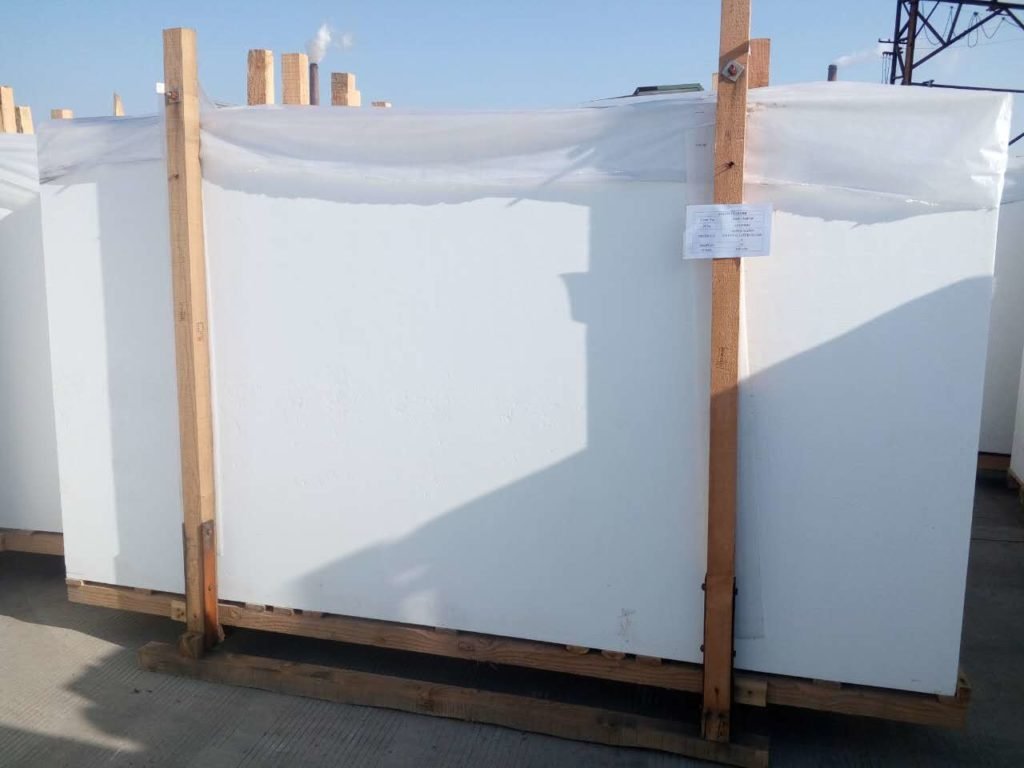
Types of Nano White Crystalline Glass
Nano White crystalline glass is broadly available in two quality categories:
- Premium Quality: Absence of any defects, black spots/ pinholes. Pure, consistent, smooth and ultra-bright slabs.
- Standard Quality: Presence of minor spots, pinholes and variations.
Price of Nano White: ₹295 per square foot to ₹425 per square foot
Thickness of Nano White: 20 mm
Size of Nano White: 10 feet x 5.5 feet
Rating of Nano White as Kitchen Countertop Material: 4.6/5
Recommendations:
Nano White Crystalline Glass is an excellent material for Kitchen Countertops. Durability is not a problem, but it is only available in white. If white doesn’t suit your palette, refer to granite or full-body slabs. Make sure you buy Original Nano white Crystalline Glass Slabs from a reputed dealer.
Remarks:
Nano white is a little expensive compared to other kitchen countertop materials but I would say, if you really love white, it’s worth it!
Despite its strength, Nano white may crack under localised pressure or white cutting. Make sure you handle them with care and inspect them before installation.
3. Petros® Slab Countertops
Petros® slabs are entirely made up of engineered stone and cooked at very high temperature and pressure conditions to make them strong, hard, chemical and stain-resistant. Because of this, they are also suitable for outdoor applications. They are a drastic advancement over Quartz stone slabs and are manufactured using a fully automatic Italian Plant by Breton.
Petros® slabs are positioned as an alternative to granite and Nano white crystalline glass. They are available in a variety of colours and possess properties that make them a favourable kitchen countertop material. Besides, kitchen countertops can also be used for flooring and wall cladding.
Petros® slabs are available in few different sizes. The price increases with increasing sizes, but it’s important that you choose a size that best fits your requirement. This will reduce the incurring wastage and ultimately drive down the total cost of the project.
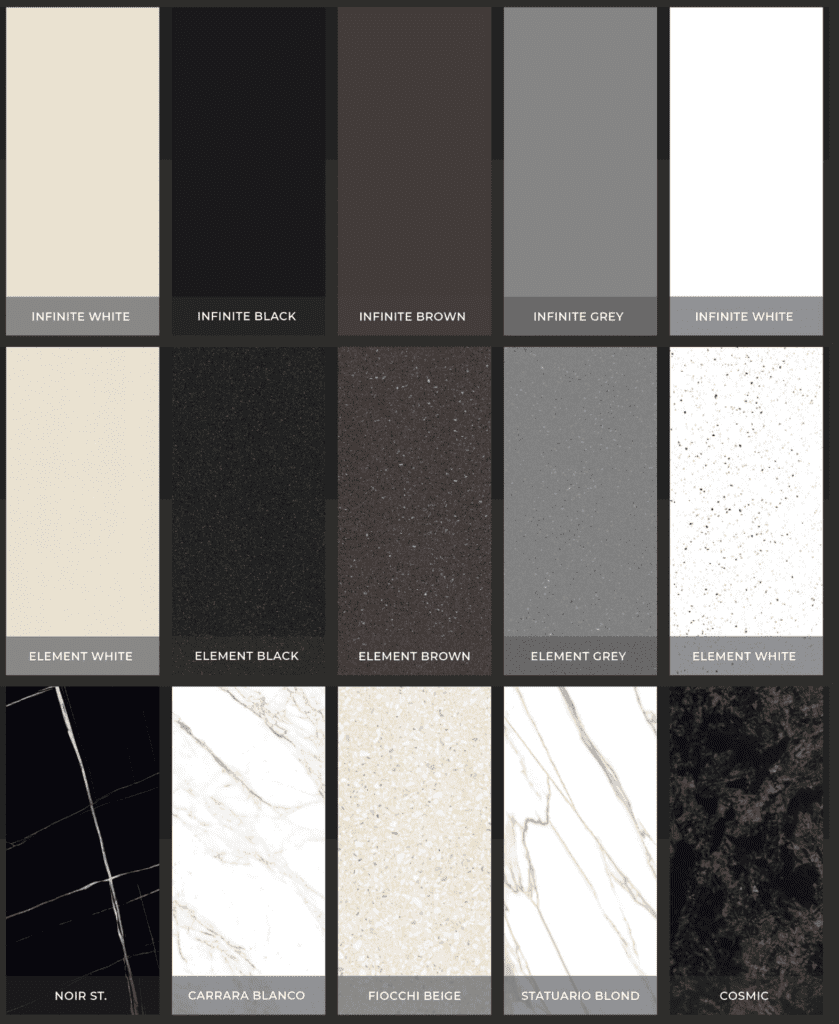
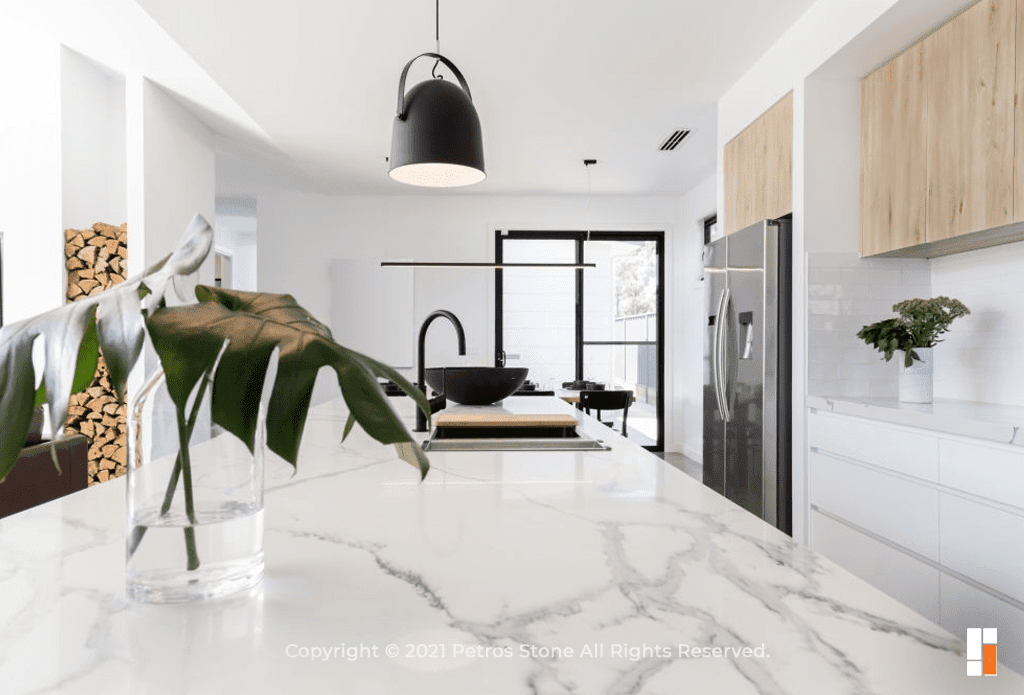
How to choose the Right Petros® Stone slab for your Kitchen Countertop?
Almost every big name brand has come up with its own engineered stone slabs. It is imperative to understand that there’s a major difference between their products. Thus, you shouldn’t always go for the cheapest option. Well-placed quality control measures ensure colour and thickness consistency across all slabs.
If you are interested in exploring the wide range of Petros® colours: browse our gallery here.
Price of Petros®: ₹255 per square foot to ₹2225 per square foot
The Thickness of Petros®: 15 mm/20 mm/30 mm
Size of Petros®slabs: 10.5 feet x 5.5 feet
Rating of Petros® slabs for kitchen countertops: 4.6/5
Recommendations:
Splendid choice but size can be a limitation. IF you are fond of plain, clean and minimal countertops, this is the perfect kitchen countertop material for you.
Remarks:
Petros® Slabs strike an outstanding balance between price and properties, making for a very suitable material for most Indian kitchen countertops. The colour range is extensive and you can almost always find a colour that perfectly suits your design.
4. Quartz Stone Slab Countertops
Before full body slabs took a huge bite out of the artificial stone segment, quartz stone slabs were one of the few options for plain, clean and simple kitchen countertop materials.
Quartz Stone slabs are made by blending natural stone(quartz) with binders and polymers, creating a vacuum and shaping the mix into slabs.
Unlike full-body slabs, they are not manufactured at extreme pressure and temperature conditions. Hence, they have inferior chemical and stain resistance. However, quartz stone countertops are not as brittle as full-body slabs. This makes it easy to cut, process and handle them. Quartz stone slabs are less prone to cracking and fracture when compared to full body slabs.
Quartz stone slabs are available in a wide range of colours and designs. The most appealing feature of quartz stone slabs is the marble patterned quartz stone slabs. The marble-type quartz stone slabs mimics the nature of marble throughout its thickness. This means that they can be moulded and edge finished with consistent marble patterns on the edges. This appears much more realistic than single layer digital prints on top of full-body surfaces.

Quartz stone slabs, however, cannot be used for exterior applications. When exposed to direct sunlight, high temperatures and harsh weather conditions, quartz stone slabs degrade. Discolouration, bending are some common issues faced when quartz countertops are used in outdoor conditions.
Under shade and indoors, this is not a problem.
Price of Quartz Stone Slabs: ₹195 per square foot to ₹425 per square foot
Thickness of Quartz stone Slabs: 15 mm/20 mm/30 mm
Size of Quartz stone Slabs: 10 feet x 4.75 feet
Rating of Quartz Stone slabs as a kitchen countertop material: 3.5/5
Recommendations:
Avoid using quartz countertops in exterior and areas exposed to direct sunlight. They are scratch resistant and subtle in their appearance. Would highly recommend that you have a look at marble-type quartz stone countertops before deciding.
Remarks:
Quartz countertops are hard, solid, flexible and an overall durable kitchen countertop material. Presence of exotic colours, designs and patterns make them a designer’s choice.
5. Marble Countertops
Marble is a metamorphic rock comprising of calcite and dolomite. Marble is soft and porous.
And hence is vulnerable to staining. Hence, we highly advise you to seal your marble countertops after installation. This process, on average, must be repeated every six months. This makes it a very high maintenance kitchen countertop material.
What makes It all worth it is, it is one of the most beautiful rocks on earth. The mix of colours, elegant patterns really adorn the kitchen.
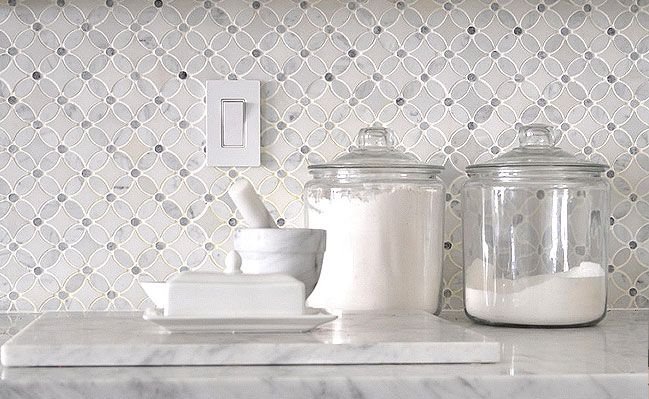
Marble can be really cost effective, but it highly depends on the marble you choose for your countertop. There are many Indian marbles that are beautiful without being too expensive.
However, Indian Marble is rarely used for kitchen countertops. Italian, Turkish and Iranian marbles are preferred as kitchen countertop materials on account of their superior appearance.
Price of Marble: ₹45 per square foot to ₹1625 per square foot
Thickness of Marble: 20 mm/30 mm
Size of marble: Highly variable
Rating of Marble as a kitchen countertop material: 3.2/5
Recommendations:
Avoid using marble countertops if you are a frequent cook. I would say, if you really love marble, opt for a marble type quartz countertop. Marble countertops are only recommended if you are a natural stone aficionado and don’t mind the periodic hassle.
Remarks:
Marble countertops may be extremely cost effective. Their porosity and inferior mechanical properties are the only downfall. Make sure you seal your marble countertop from time to time.
6. Metal Countertops
Metal countertops are typical of restaurant kitchens. However, recently they have reclaimed themselves as a stylish and unique kitchen countertop material. Metal countertops are sleek, sterile, heat and chemical resistant. They are very easy to clean.
On the other hand, metal kitchen countertops are easy to scratch or dent. They are susceptible to fingerprints and smudges. The most common issues associated with metal countertops: heat up quick and are very noisy.
Stainless Steel
Stainless steel countertops provide a sterile and industrial look to the kitchen. Though they seem to look “cold”, in some situations, they can actually fit in pretty well.

Copper
Second most common metallic kitchen countertop material is copper. Unlike the “cold” appearance of stainless steel, copper looks much more natural and “warm”. Copper countertops change colour overtime. For rustic styles, copper countertops can be a unique and elegant addition to the kitchen.
Copper countertops are naturally anti microbial, making them an excellent choice for the germ phobic cook. However, copper is soft and relatively more susceptible to scratching and denting.
Zinc
Other than stainless and copper, countertops made from zinc and copper have also gained popularity. Zinc has a very subtle and subdued look when compared to stainless steel and hence appears much less industrial. Zinc also changes colour.
Brass
Brass is an allow of copper and zinc. Brass is one of the rarest kitchen countertop materials. That said, it is shiny, lustrous and much harder than other metals. This makes it less prone to scratching and denting.
Not only is it mechanically strong, but is also visually appealing. Its beautiful golden hues change over time, giving the kitchen with grace, age and sophistication.
Price of Metal Countertops: ₹15,000 to ₹50,000 per kitchen countertop
Thickness of Metal Countertops: Custom
Size of Metal Countertops: Custom Built
Rating of Metal as Kitchen Countertop Material: 3.5/5
Recommendations:
Highly susceptible to scratching and denting. They get hot and cold quickly. If that is not a big deal for you and you admire the professional look. Go for it!
Remarks:
The experience of using a metal kitchen countertop can be extremely new, so make sure you and the cook comprehensively understand what metal countertops entail.
7. Tile Countertops
Tile countertops instantly create a Mediterranean imagery. Plain chequered dual-coloured tile countertops add character and an agrarian look to the kitchen/ However, it doesn’t always have to be ceramic tiles. Granite, marble or even slate tiles can look unique. Natural materials like granite, marble and slate are also more resistant to chemicals, stains and heat.
The only hiccup with tiled countertops is the food and dirt which gets stuck in the grout. For deeper grooves, this problem is amplified but for thinner and shallower finer grouts it not a such colossal problem.
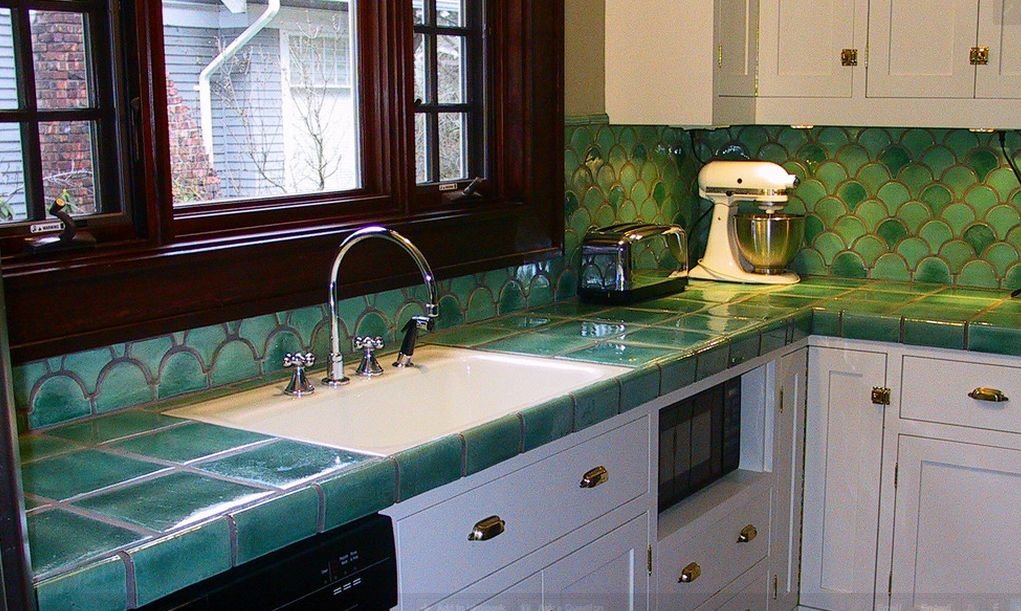
Tiled Countertops also give you the largest level customisation. There are hundreds if not thousands of colours, designs and textures of ceramic tiles readily available in the market. Nonetheless, plain and shine ceramic tiles are the most popular for kitchen countertops.
Price of Tile Countertops: ₹50 per square foot to ₹250 per kitchen countertop
Installation costs can be higher.
Thickness of Tile: 10 mm
Size of Tile Countertops: Tiles ranging from 1ft to 8ft are available
Rating of Tile as a kitchen countertop material: 3.8/5
Recommendations:
Ceramic tile is adequately stain and chemical resistant, but certainly not the strongest kitchen countertop material. Although, this won’t be a huge problem considering no major forces are involved.
Tile countertops are beautiful and highly customisable owing to the enormous variety of tiles readily available in the market.
8. Glass Countertops
Glass is one of the most durable and unique kitchen countertop material. Glass countertop will not age. Glass can be designed in a multitude of colours, textures and designs. Glass is also extremely heat resistant. Glass is non-porous unlike stone, and hence impossible to stain. Glass is also available in a variety of textures and colours.
Though glass countertops are resilient to heat and stains, they are prone to cracking and chipping. And once they do, they are expensive to repair.
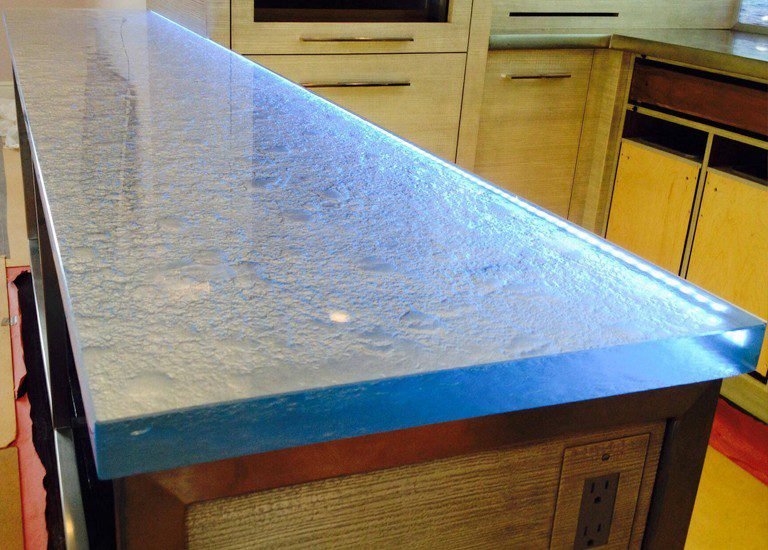
Types of Glass for Kitchen Countertops
- Crushed Glass
- Crushed pieces of recycled plastic are embedded in a matrix of acrylic or concrete. This eco-friendly kitchen countertop is trending and gaining popularity.
- Besides being extremely cost effective, they are a unique and artistic addition to the kitchen.
- Back painted Glass
- Back-painted Glass countertops look subtle. Paired with muted colours, back-painted glass kitchen countertops display an air of sophistication. These sleep and modern countertops complement a contemporary kitchen aesthetic.
- Functional Art
- If you are not a fan of the clean and simplistic kitchen countertop, do not worry, glass countertops will not disappoint you.
- Textured Glass
- Textured glass look futuristic and modern without being too bland or simple. Textured glass can be augmented with LED lighting to enhance their beauty. Textured glass is translucent and interacts with light to create a “cyberpunk” aesthetic.
Price: ₹48 per square foot to ₹250 per square feet for transparent glass kitchen countertop
Thickness: 3 mm – 19 mm
Rating: 3.8/5
Recommendations:
Glass countertops look modern and futuristic. Highly recommended for everyone except the reckless cook!
9. Concrete Countertops
Concrete countertops are handcrafted surfaces popular in outdoor kitchens. They are exceptionally durable and easy to clean. Concrete countertops are highly preferred because of their customisation possibilities.
Not only can you customise the countertop colour but also its edge profile, thickness, shape and the surface finish. You can also cast in custom features for your countertop without driving up the cost too high.
Concrete can either be left grey or can be pigmented to resemble stone. You can also mix recycled glass, quartz or other aggregate to enhance its strength and beauty at the same time. Concrete countertops can turn out to be expensive. Since these are handcraft you’d want a professional to do it for you. Though you can DIY it but it will take some time before you develop your skill.
The major issue with concrete countertops is their porosity. They will easily catch stains and hence it regular sealing and waxing of the countertop is highly recommended.
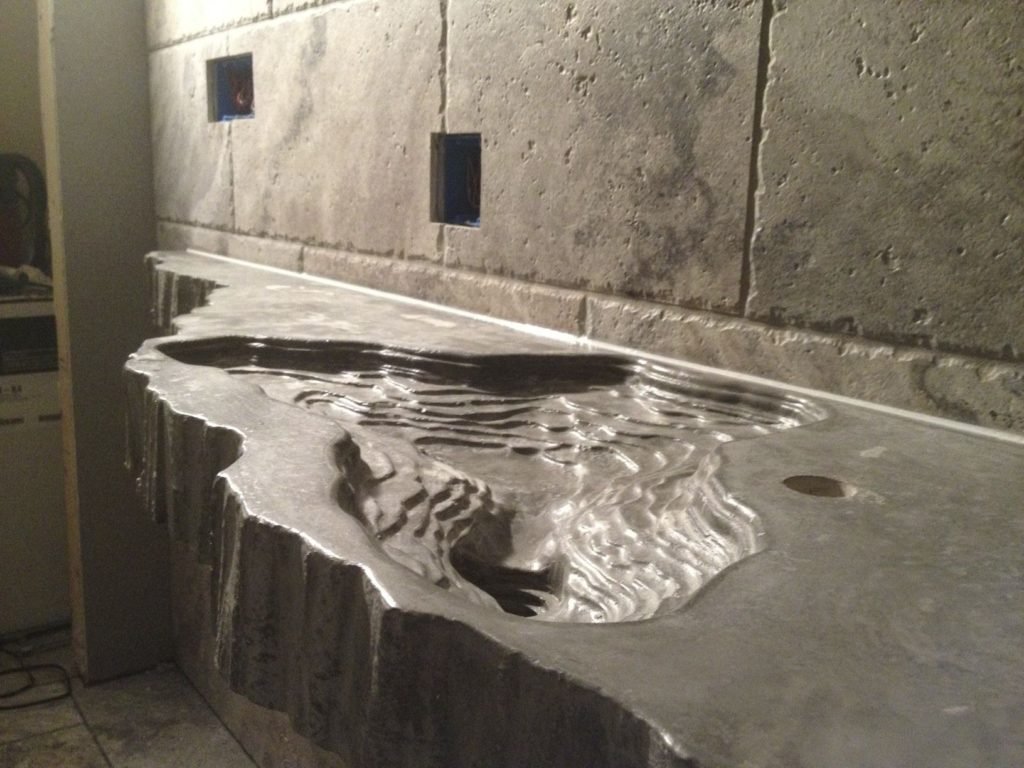
Price: ₹25,000 to ₹50,000 per kitchen countertop
Thickness: Customisable
Size: Customisable
Rating: 4.2/5
Recommendations:
Concrete countertops give you the ability to highly customize your countertop design. Make sure you make the best use of this. We advise you regularly seal them with the help of a professional. Ensuring that the countertop is properly sealed is important to prevent it from staining.
10. Slate Countertops
Slate is not a material usually associated with kitchen countertops. But once you get to know about slate countertops, you will wonder why!
Slate is a natural stone. It’s beautiful texture and a rich mixture of grey and black tones perfectly complementing a rustic kitchen design. Slate is also easy to handle and cut to the required shape driving down installation costs. Slate is less porous than granite or marble, making it adequately stain and chemical resistant. Despite this, it is highly advised you seal the slate countertop.
Slate is prone to cracking, and hence it is recommended you round off the corners to combat this phenomenon.
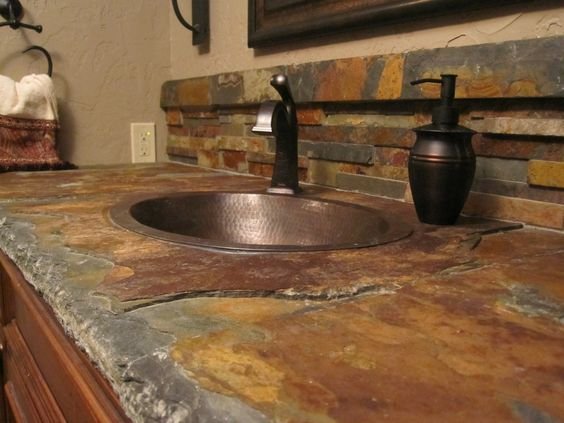
Price: ₹90 per square foot to ₹250 per square foot
Thickness: 10mm/17mm/20mm
Size: 8 feet x 4 feet (Approximately)
Rating: 4.7/5
Recommendations:
If you love the colour and texture of slate and if it complements your design, go for it! Make sure you round off the corners to prevent cracking.

Hi, I’m Dhananjay,
With a background in architecture and years of industry experience, I share insights on materials that shape great design. At Petros® Stone, I craft content that highlights the beauty and utility of natural stone, helping architects, builders, and homeowners make informed choices while strengthening the brand’s voice and online presence.
Brown Granite
White Galaxy Granite
Blue Bahia Granite
Silver Cloud Granite
Black Pearl Granite
Dallas White Granite


